
How To Understand the Future of Decentralized Autonomous Organizations
ebook include PDF & Audio bundle (Micro Guide)
$12.99$6.99
Limited Time Offer! Order within the next:

The world is shifting toward decentralized systems, and at the forefront of this transformation is the rise of Decentralized Autonomous Organizations (DAOs). In the early stages of the blockchain revolution, DAOs were seen as a futuristic idea with the potential to disrupt traditional organizational structures. However, as the technology and the understanding of blockchain develop, DAOs have become an increasingly important element of the future of business, governance, and beyond.
DAOs are organizations governed by rules encoded as smart contracts on a blockchain, with no central leadership or authority. They aim to remove intermediaries and centralize decision-making within a network of participants who hold tokens, vote on proposals, and collectively manage the organization's resources. This radically different approach could change the way we think about organizations, their roles, and the very nature of decision-making and governance.
In this article, we will explore the concept of DAOs, their current state, the challenges they face, and their future potential. We will also look at how DAOs are likely to evolve and impact industries, from finance to politics and beyond, in the coming years.
The Rise of DAOs: A Brief Overview
What Are DAOs?
Decentralized Autonomous Organizations (DAOs) are digital organizations that operate without a central authority. Unlike traditional companies or organizations, DAOs are built using smart contracts on blockchain platforms. These smart contracts are self-executing agreements where the terms of the contract are directly written into lines of code. When certain conditions are met, the contracts automatically enforce the terms, removing the need for intermediaries such as banks, lawyers, or managers.
DAOs typically use a governance model where stakeholders can vote on proposals that affect the organization's direction, policies, and resource allocation. These stakeholders are often token holders who participate in governance through mechanisms like voting or staking. DAOs rely on the collective input and collaboration of the community members rather than a single leadership figure or hierarchical structure.
Early Development of DAOs
The concept of DAOs emerged in the early 2010s with the advent of blockchain technology. The first major DAO project was "The DAO," launched in 2016 on the Ethereum network. The DAO was a venture capital fund that allowed participants to invest in projects and make decisions through voting. However, it was infamously hacked, and a significant portion of the funds was drained. This incident led to the controversial Ethereum hard fork that created Ethereum and Ethereum Classic.
Despite this setback, the concept of DAOs continued to evolve. Ethereum developers worked on improving smart contract security, governance models, and the overall architecture of decentralized organizations. Over the years, DAOs began to be applied to various sectors, including decentralized finance (DeFi), governance, social networks, and more.
How DAOs Work
DAOs operate on the principle of decentralization and autonomy. To understand their future potential, it's important to examine how DAOs function in practice.
Smart Contracts and Governance
Smart contracts are the foundation of DAOs. These contracts are pieces of code deployed on a blockchain that define the rules of the organization and the processes for decision-making. Smart contracts can automatically enforce actions such as voting, executing proposals, and distributing funds without the need for human intervention.
Governance within a DAO is typically facilitated through token-based voting. Token holders can propose changes to the organization, vote on these proposals, and determine the direction of the DAO. The voting power is often proportional to the number of tokens a participant holds, although some DAOs use alternative governance models like quadratic voting to ensure fairness.
Decentralized Decision-Making
One of the key principles of DAOs is that decisions are made collectively by the community, rather than by a central authority. This decentralization allows for more inclusive and democratic governance. In a DAO, decisions are made through a transparent and open voting process, where all token holders have the opportunity to influence outcomes.
This approach challenges the traditional top-down hierarchical structure of organizations, where executives and board members make decisions on behalf of stakeholders. Instead, DAOs aim to flatten the decision-making process, allowing every participant to have an equal say in the governance of the organization.
Transparency and Accountability
Transparency is another crucial feature of DAOs. Since DAOs operate on blockchain technology, all actions and transactions are publicly visible and recorded on the ledger. This ensures that the organization's financial transactions, voting results, and other activities are open for scrutiny. This level of transparency promotes accountability and trust within the community, as all actions are verifiable and cannot be easily manipulated.
Challenges Facing DAOs
Despite the promising vision of DAOs, several challenges need to be addressed for them to realize their full potential.
Security and Smart Contract Vulnerabilities
The security of DAOs is one of the most significant concerns. The DAO hack of 2016 highlighted the potential vulnerabilities in smart contract code. A poorly written or flawed smart contract can be exploited by attackers, leading to significant financial losses or manipulation of governance decisions.
While the security of smart contracts has improved over time, there are still risks associated with bugs and vulnerabilities. As DAOs become more complex, ensuring the integrity of smart contracts will remain a key challenge. Developers must continuously audit and improve the code to prevent exploits and attacks.
Governance Issues and Participation
While decentralized governance is a core principle of DAOs, it also presents challenges. One of the main issues is voter apathy. In many DAOs, only a small percentage of token holders actively participate in governance decisions, leading to a concentration of power in the hands of a few individuals or groups.
Furthermore, the governance models of DAOs often rely on token-weighted voting, where individuals with more tokens have more influence. This creates a potential for plutocracy, where wealthy participants have disproportionate control over decision-making. To address this, some DAOs are exploring alternative voting models, such as quadratic voting, which aims to give more weight to the preferences of smaller participants.
Legal and Regulatory Uncertainty
DAOs exist in a legal gray area, as they operate in a decentralized manner that often falls outside the scope of traditional legal frameworks. Governments and regulators are still grappling with how to classify and regulate DAOs. In some jurisdictions, DAOs may not have legal recognition as a formal entity, which could create complications when it comes to issues such as taxation, liability, and intellectual property.
The lack of clear legal frameworks for DAOs could hinder their widespread adoption, as participants may be reluctant to engage in an organization that does not have the same legal protections as traditional businesses. Until clear regulations are established, DAOs will continue to face uncertainty in terms of their legal status and the rights of their members.
The Future of DAOs
Despite the challenges, the future of DAOs looks promising. As the technology continues to evolve, DAOs are expected to become more efficient, secure, and widely adopted across various industries. Below are some potential developments that could shape the future of DAOs.
Evolution of Governance Models
The governance models of DAOs are likely to evolve to address issues such as voter apathy and the concentration of power. One potential solution is the implementation of quadratic voting, which gives more voting power to individuals with fewer tokens. This could help to democratize governance and ensure that the voices of smaller participants are heard.
Another potential evolution is the introduction of reputation-based systems. In these systems, participants earn reputation points based on their contributions to the DAO, such as participating in governance, completing tasks, or providing valuable insights. Reputation could be used to determine voting power, helping to ensure that those who actively contribute to the organization have more influence in decision-making.
DAOs in Traditional Industries
While DAOs have primarily been associated with the blockchain and cryptocurrency space, their principles of decentralization and autonomy have the potential to impact traditional industries as well. DAOs could be used in various sectors, including supply chain management, healthcare, and even politics.
For example, DAOs could be used in supply chain management to create transparent, decentralized systems for tracking goods and ensuring fair distribution. In healthcare, DAOs could enable patients and healthcare providers to make decisions collectively about treatment plans, creating more patient-centered care models. In politics, DAOs could be used to facilitate direct democracy, where citizens can vote on policies and proposals in a transparent and efficient manner.
Interoperability Between DAOs
As the number of DAOs grows, interoperability will become increasingly important. The ability for DAOs to communicate and collaborate with one another will be crucial for creating a decentralized ecosystem. Cross-chain platforms and decentralized identity systems could enable DAOs to share data, collaborate on projects, and interact in ways that were previously not possible.
This interoperability could lead to the formation of decentralized federations, where DAOs from different sectors work together toward common goals. For example, a decentralized financial DAO could collaborate with a supply chain DAO to create a transparent and decentralized global economy.
The Role of AI and Automation in DAOs
Artificial intelligence (AI) and automation are likely to play a significant role in the future of DAOs. AI could be used to automate decision-making processes, analyze large volumes of data, and optimize the operations of DAOs. This could help to improve the efficiency and scalability of DAOs, enabling them to manage more complex tasks and handle larger networks of participants.
Furthermore, AI could assist in improving governance by providing insights into the preferences and behavior of participants. AI-powered tools could analyze voting patterns, identify potential conflicts of interest, and help DAOs make more informed decisions.
Conclusion
The future of Decentralized Autonomous Organizations is full of potential, as they represent a new way of organizing, governing, and operating in the digital age. While challenges such as security, governance, and legal uncertainty remain, the ongoing development of blockchain technology and smart contracts will likely address these issues.
As DAOs continue to evolve, we can expect them to have a transformative impact on various industries, including finance, healthcare, politics, and beyond. With the right governance models, legal frameworks, and technological advancements, DAOs could redefine how we think about organizations and governance, paving the way for a more decentralized, transparent, and participatory future.
The journey toward a decentralized future is just beginning, and DAOs will undoubtedly play a central role in shaping this new world.

How to Downsize Your Home Without Losing Essentials
Read More
How to Implement a Customer Retention Strategy for Online Sales
Read More
How to Maintain Your Home's Fence to Ensure Long-Term Durability
Read More
How to Master Coffee Shop Customer Service
Read More
How to Organize Your Bathroom with Space-Saving Storage Hacks
Read More
Printable Masks for Fantasy Characters: How to Bring Them to Life
Read MoreOther Products

How to Downsize Your Home Without Losing Essentials
Read More
How to Implement a Customer Retention Strategy for Online Sales
Read More
How to Maintain Your Home's Fence to Ensure Long-Term Durability
Read More
How to Master Coffee Shop Customer Service
Read More
How to Organize Your Bathroom with Space-Saving Storage Hacks
Read More